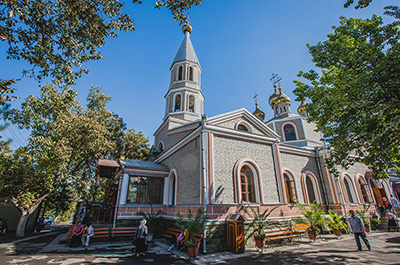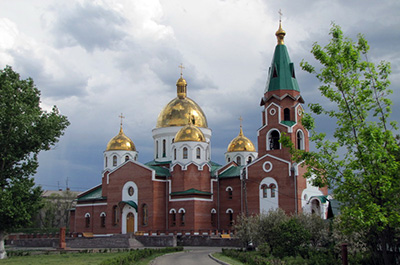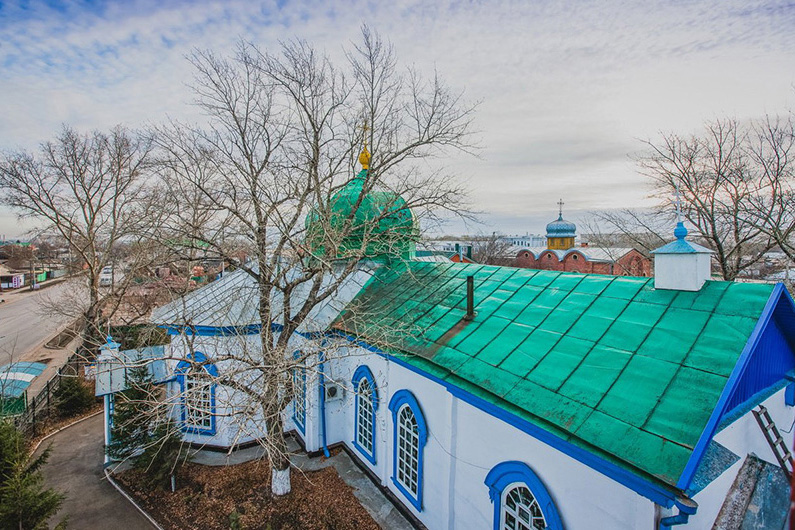
Word from the Head of the Orthodox Church of Kazakhstan, Metropolitan Alexander of Astana and Kazakhstan on the occasion of the graduation ceremony and the end of the 2023/2024 academic year at the Alma-Ata Theological Seminary
- 21.06.2024, 11:55
- Новости на английском языке

On June 20, 2024, in Alma-Ata, at the spiritual and cultural center of the Kazakhstan Metropolitan District named after Metropolitan Joseph (Chernov), a graduation ceremony was held for graduates of the Alma-Ata Orthodox Theological Seminary.
The ceremonial act was led by Metropolitan Alexander of Astana and Kazakhstan, professor of the department of church history of the theological school. The Head of the Orthodox Church of Kazakhstan addressed the participants with greetings:
Your Reverence, Father Rector!
All-honorable fathers, dear brothers and sisters!
I heartily congratulate the rector, administration, teachers and students of the Alma-Ata Orthodox Theological Seminary on the celebration of the Ascension of the Lord and the end of the academic year, the graduates of our theological school on significant events in life - the defense of qualifying works and the presentation of diplomas.
The current year is marked by a historical date - 25 years have passed since the creation of the Astana and Alma-Ata diocese on the territory of Kazakhstan. This event gave a serious impetus to the development of various aspects of church life, including spiritual education. Next year, our seminary will cross the fifteen-year threshold of its work in the southern capital, you and I will sum up this period, small in the scale of history, but important in terms of training pastoral personnel for the entire Kazakhstan Metropolitan District.
Each new graduation, replenishing the number of theologically literate and educated ministers of the Church of Christ, is proof that our seminary was not created in vain, that it lives, develops and continues to serve its main goal - the education of those who will bear the word of God, in fulfillment of the commandments of the Lord : “Go into all the world and preach the gospel to all creation” (Mark 16:15).
Quite recently, on the previous Sunday, you and I prayerfully remembered the holy fathers and teachers of the First Ecumenical Council. If you carefully study the history of the Church, if you look closely at the faces of those saints and ascetics, and reflect on the essence of their feat, then you can see that each of them selected a language, developed terminology and found approaches that were necessary precisely in that era in order to teach the gospel message to contemporaries.
All these noble tasks are facing us today. The Lord entrusts to all of us - clergy, teachers, students and graduates - the same apostolic task and mission, which is that we, firstly, know the Holy Scriptures and the Tradition of the Church well, are completely rooted in it, in it We were looking for answers to emerging questions, secondly, we could formulate answers, inspired by love for our native Orthodoxy and convey these answers to people in a language they understand. Christ expects us to bring the true light of the Gospel to people, and boldly refute all false teachings, relying on the word of God and the centuries-old experience of the Church. The Savior promised to remain with us until the end of the age (Matthew 28:20); He generously gives us in the service of the Divine Liturgy, in prayer before His throne, everything we need - the strength and grace necessary to carry out this apostolic feat. Do not forget the importance of personal example in the work of gospel witness. One monk asked the Venerable Pimen the Great: “Can I give orders to the new brothers who live in the monastery?” "No! - answered Saint Pimen, “be an example for them, and not a legislator!”
The Church, emphasizing the importance and necessity of acquiring knowledge, warns us against this type of education that puffs up a person, fills him with pride and self-exaltation. True church education is associated with sacred virtues: faith, hope and love. Knowledge is a great power, but it will never replace a person’s conscience and kindness and, taken outside the context of true spirituality, can lead to disaster both at the level of an individual and at the level of entire communities.
In the life of the ancient saint, St. Daniel the Stylite, there is such a story-parable. One ascetic, sitting in his cell, heard a voice: “Come, I will show you the deeds of men.” The monk went out, and the angel who appeared pointed him to a man who had cut the firewood, tied it up and tried to lift the bundle onto his shoulders, but was unable to do so. Instead of reducing the wood, he chopped it even more and, increasing the load, again began to lift it and again could not. He repeated all this many times. Then the angel pointed out to him another man who was standing at the well, diligently drawing water and pouring it into a leaky bucket, from which water again spilled into the well. And the angel showed the third vision to the ascetic: some two people, sitting on horses and holding a log across the door, were trying to carry it into the temple. No matter how hard these unfortunates tried, their work was in vain - the log was much longer than the width of the door and they did not want to turn it lengthwise. The Monk Daniel interpreted the vision of “human affairs.” A woodcutter is a person living in sins, who, instead of bringing repentance, constantly multiplies evil. He who draws water is one who does a lot of good, but does not forsake his sins, and therefore wastes the grace he receives. And two people carrying a log are an image of virtuous people, but proud and stubborn. What does this ancient ascetic story teach us? He depicts the tragedy of human existence, shows how sin destroys human life, how evil can devalue virtues and make the most active work in vain. Therefore, again and again I would like to remind everyone - teachers, graduates and students - of the need for continuous personal spiritual improvement. Now you are light in the Lord and live as children of light (Eph. 5:8), we hear the call of the Apostle Paul.
To be a “child of light” means to remain faithful to one’s Christian calling – to bring the light of love and Divine truth to the world. It can be difficult for us to live even one day without mistakes and unkind deeds, but we can and should live every day so that it is written in the book of life in golden letters of the good deeds we have committed.
Let the new stage of your life that begins today be illuminated by Divine light, and you, as “children of light,” will carry it and share it with your neighbors, so that, seeing your good deeds, they glorify our Father in heaven (Matthew 5:16).





















